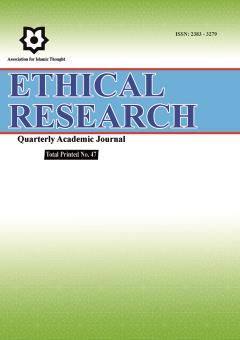Patterns and methods of moral development in childhood from the perspective of Nahj al-Balaghah
Subject Areas : اخلاق و تربیت اسلامی
Jafar Shahbazi
1
![]() ,
Seyed Nader Mohammadzadeh
2
*
,
Gholam Hossein Entesar Foumani
3
,
Seyed Nader Mohammadzadeh
2
*
,
Gholam Hossein Entesar Foumani
3
1 -
2 -
3 -
Keywords: Quran, Nahj al-Balaghah, ethics, moral development, child.,
Abstract :
The extent of morality and the expression of rational behavior in the teachings of Nahj al-Balaghah is undeniable. This article has an analytical and descriptive approach with the aim of examining the pattern of moral development in childhood among the teachings of Nahj al-Balaghah. Morality is the most basic and important thing that happens in individual and social life, and it undoubtedly colors and gives direction to everything in life. Imam Ali (AS) The only thing he believes in is to stand on it and be prejudiced and not deviate from it is morality. For creatures that are in the process of change, evolution, growth and evolution, there is usually a good season in which they reach their best and most suitable growth and the expected effects of them are manifested. Childhood, when the child still has a pure heavenly heart. The principle of "love and respect" as a basis for communication with children, just as the principle of "model method" along with love has never been neglected. The principles of "reminder", "moderation" and "encouragement", "learning lessons" and "practical training" are other principles of methods of moral development in the life of Imam Ali (as).
قرآن(ترجمه الهی قمشه ای)
نهج البلاغه(1379)، ترجمة محمد دشتی، قم، 1379. انتشارات لقمان.
ابن شعبه حرانى، تحف العقول، مقرن چهارم، چاپ دوم 1404 ق، جامعة مدرسين.
ابن فارس بن زکرّيا، أبوالحسين احمد، معجم مقاييس اللغة، بتحقيق و ضبط عبدالسلام محمد هارون، الطبعة الثانية، شرکة مکتبة و مطبعة الحلبي، مصر.
ابى الحديد معتزلى، شرح نهجالبلاغه ابن ابىالحديد، م 656، چاپ اول 1378، داراحياء الكتب العربيه، عيسى البابى الحلبى و شركاه.
ابى الحديد معتزلى، شرح نهجالبلاغه ابن ابىالحديد، م 656، چاپ اول 1378، داراحياء الكتب العربيه، عيسى البابى الحلبى و شركاه.
احمد پور، مهدی، کتابشناخت اخلاق اسلامی، دفتر تبليغات اسلامی حوزه علمیه قم. معاونت پژوهشی. پژوهشگاه علوم و فرهنگ اسلامی، قم - ایران، 1385 ه.ش.
التمیمی الآمدی، عبدالواحد ابن محمد: «غررالحکم و دررالکلم»، محمد علی انصاری، دار الکتاب، قم، 1373.
داودي، محمد سيره تربيت پيامبر(ص) و اهل بيت، ج 3، (1392) پژوهشگاه حوزه و دانشگاه.
دلشاد تهرانى، مصطفى، سيرى در تربيت اسلامى، چ چهارم، تهران، ذكر، 1375.
. روشهای تربیت در نهج البلاغه، تهران: دریا، ۱۳۷۹.
الراغب الاصفهاني، أبوالقاسم الحسين بن محمد، المفردات في غريب القرآن، تحقيق و ضبط محمد سيّد کيلاني، دارالمعرفة، بيروت.
طباطبائي، سيدمحمدحسين (1374)، الميزان في تفسير القرآن، ترجمة سيدمحمدباقر موسوي همداني، چ پنجم، قم، جامعه مدرسين.
طوسي، خواجه نصيرالدين (1360)، اخلاق ناصري، تصحيح مجتبي مينوي و عليرضا حيدري، تهران، خوارزمي.
المتقى الهندى، كنزالعمال، م 975، چاپ مؤسسه الرساله، بيروت، لبنان.
مجلسى محمد باقر، بحارالانوار، م 1111، چاپ دوم 1403، مؤسسه الوفاء، بيروت، لبنان.
مطهرى، مرتضى، تعليم و تربيت اسلامى،(1375) تهران، صدرا.
...............................، آشنایی با علوم اسلامی: کلام - عرفان - حکمت عملی، (1377) تهران، صدرا.
...............................، اسلام و مقتضيات زمان، ج ۱، (1380) تهران، صدرا.

